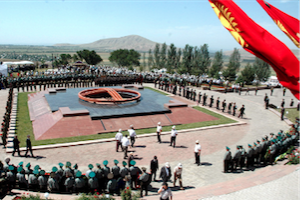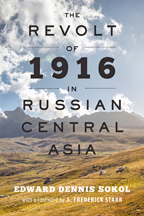CACI Event Invitation: China's Belt Road Initiative in Eurasia: The Challenge of Fostering Sustainable Connectivity
China's Belt Road Initiative in Eurasia: The Challenge of Fostering Sustainable Connectivity
Co-sponsored by the Davis Center for Russian and Eurasian Studies and the Fairbanks Center for Chinese Studies at Harvard; and the Mossavar-Rahmani Center for Business and Government; and the Central Asia-Caucasus Institute at the the American Foreign Policy Council
Since its official launch in 2013, China's Belt and Road Initiative (BRI) has become a topic of intense research and and discussion. While there is no shortage of research projects on the features and implications of Beijing's massive investments in infrastructure connecting Asia with Europe and Africa, our understanding of linkages between China's activities in various geographic regions and emerging interdependencies is limited. This roundtable will gather experts on Chinese investments and policies in Europe, the South Caucasus and Central Asia (the Silk Road region of the BRI) to present a more comprehensive picture of Chinese-designed connectivity in Eurasia.
Roundtable participants will discuss the current responses by policy makers in the EU, the South Caucasus, Central Asia and the US to the BRI and the changing realities that it is producing. They will also propose their visions of what is desirable and feasible, taking into consideration the opinions of American and European officials regarding the importance of environmental standards and the need for a level-playing field for companies. The European Commission recently published the Joint Communication "Connecting Europe and Asia – Building Blocks for an EU Strategy" explaining its own approach to connectivity as sustainable, comprehensive and rules-based and enlisting its plans for raising investment to foster such sustainable connectivity. This promises to be a tall order--what role can (or should) the US play?
Philippe Le Corre is a Senior Fellow at the Mossavar-Rahmani Center for Business and Government at the Harvard Kennedy School. He is also a nonresident Senior Fellow with the Carnegie Endowment for International Peace and Associate with the Fairbank Center for Chinese Studies at Harvard. He was previously a Fellow with the Brookings Institution in Washington, and a Special Assistant for International Affairs to the French Minister of Defense. For the past five years, he has specialized on China-Europe relations, Chinese overseas investments and China's foreign policy, authoring many articles and reports, including the newly published "China as a Geoeconomic Influencer: Four Case Studies" (Carnegie Paper, 2018). His latest book, China's Offensive in Europe, was published by Brookings Press in 2016.
Mamuka Tsereteli is a Senior Fellow with the Central Asia-Caucasus Institute, part of the American Foreign Policy Council, based in Washington DC. He is a Senior Adjunct Professorial Lecturer at School of International Service at American University. He served as a Director, Center for Black Sea-Caspian Studies at AU between 2009-2013, and as an Assistant Professor at School of International Service in 2007-2011. Dr. Tsereteli is a member of the part time faculty at Johns Hopkins SAIS. His areas of interests include international relations and international economic policy, economic and energy security, political and economic risk analysis and mitigation strategies, and business development. Dr. Tsereteli previously served as Founding Executive Director at the America-Georgia Business Council, and Economic Counselor at the Embassy of Georgia in Washington, covering relationships with international financial institutions, US assistance programs and business initiatives.
Nargis Kassenova is a Senior Fellow at the Davis Center for Russian and Eurasian Studies, Harvard University, where she leads the Program on Central Asia. She is an Associate Professor at the Department of International Relations and Regional Studies of KIMEP University based in Almaty (Kazakhstan) where she launched both the KIMEP Central Asian Studies Center (CASC) and China and Central Asia Studies Center (CCASC). Her areas of research include Central Asian politics and security, Eurasian geopolitics, Kazakhstan's foreign policy, and religion and politics in Central Asia.
Svante E. Cornell is the Director of the Central Asia-Caucasus Institute & Silk Road Studies Program Joint Center, and a co-founder of the Institute for Security and Development Policy, Stockholm. His main areas of expertise are security issues, state-building, and transnational crime in Southwest and Central Asia, with a specific focus on the Caucasus and Turkey. He is the Editor of the Central Asia-Caucasus Analyst, the Joint Center's bi-weekly publication, and of the Joint Center's Silk Road Papers series of occasional papers. Cornell is Senior Fellow for Eurasia at the American Foreign Policy Council. He is a member of the Swedish Royal Academy of Military Science, and a Research Associate with the W. Martens Center for European Studies in Brussels. He is a Senior Fellow with the American Foreign Policy Council and an Associate Research Professor at the Johns Hopkins University's School of Advanced International Studies. Formerly, Cornell served as Associate Professor of Government at Uppsala University.
Speakers:
Philippe Le Corre, Mossavar-Rahmani Center for Business and Government, Harvard Kennedy School
Mamuka Tsereteli, Senior Fellow, Central Asia-Caucasus Institute at the American Foreign Policy Council
Nargis Kassenova, Davis Center for Russian and Eurasian Studies, Harvard University
Moderator: Svante E. Cornell, Director, Central Asia-Caucasus Institute at the American Foreign Policy Council
Where: CGIS South Building, 1730 Cambridge Street, Room S354, Cambridge, Massachusetts 02138
When: Tuesday, October 30, 2018 from 2:00 - 4:00 pm
RSVP: Click HERE to register
More Details: Please call 617-495-4037.
America Needs Clear Strategy for China's Presence in Central Asia
By Mamuka Tsereteli
Since the Barbary Wars of the early 19th century, the United States has been involved in protecting trade routes while advancing a policy of open trade and shared access to resources. Free access to global commodities like oil, grains and metals remains an important goal of the U.S. national interest, guaranteeing global economic and political stability.
IMF Economic Outlook on Caucasus and Central Asia: Structural Transformation Needed

CACI FORUM
IMF Economic Outlook on Caucasus and Central Asia: Structural Transformation Needed
Wednesday, 30 November 2016, from 5 to 7 p.m.
Light reception with Georgian wines at 5; main program at 5:30
A decline in commodity prices and slowing in key economic partners such as Russia and China, had a significant impact on the countries of Central Asia and the South Caucasus. Regional growth is projected to average only 1.3 percent this year, representing a dramatic decrease in economic activity compared with growth rates of the early 2000s. According to the IMF, next year the region's economies should turn a corner, with average growth reaching 2.6 percent. Medium-term prospects remain weak, however, with growth projected to average 4 percent in the 2018–21 period, half that in 2000–14.
These and other important economic topics will be discussed as part of the Regional Economic Outlook Report, the latest IMF release on the Caucasus and Central Asia. The special focus of this year's presentation is Kazakhstan: the discussion will review this country's macroeconomic and structural policy response to shocks that began in late 2014, and will examine prospects for the medium term.
Speakers:
Juha Kahkonen, Deputy Director, Middle East and Central Asia Dept., IMF
Mark Horton, Mission Chief, Kazakhstan, IMF
Moderator:
Mamuka Tsereteli, Research Director, Central Asia-Caucasus Institute
Rome Building Auditorium
SAIS - Johns Hopkins University
1619 Massachusetts Ave., NW
Washington, DC 20036
Kazakhstan 2041: the Next Twenty-Five Years
Revolt in Central Asia: The Cataclysm of 1916

Revolt in Central Asia:
The Cataclysm of 1916
Wednesday, June 8, 2016, from 5 to 7 p.m.
(reception at 5 p.m., followed by the main program at 5:30)
A century ago, at the time of World War I, hundreds of thousands of Central Asians – Kazakhs, Tajiks, Turkmen, Uzbeks, and above all Kyrgyz – perished when they revolted against the tsarist Russian government's attempt to draft them into the army. Besides those who were killed outright, tens of thousands of Kyrgyz men, women, and children died trying to escape over treacherous mountain passes into China.
Soviet authorities have long suppressed Information on the 1916 revolt, but its Centennial has generated fresh interest, marked by seminars, mass meetings, and publications. Russia, in the meantime, has closed relevant archives and offered the curious thesis that the revolt was actually directed not against Russian rule, but against the authority wielded by the indigenous Turkic bourgeoisie.
The Central Asia-Caucasus Institute marks the centennial of the tragic loss of Central Asian life with two major publications: a new edition of the book The Revolt of 1916 in Russian Central Asia by Edward Dennis Sokol, with foreword by Dr. S. Frederick Starr (JHU Press); and a Silk Road Paper entitled Central Asia in Revolt: the Cataclysm of 1916, edited by Zamira Sydykova. Both of these publications will be presented and discussed at this forum.
This event can now be viewed on the SAIS Events YouTube channel.
Speakers will include:
Zamira Sydykova, Ambassador, Editor in Chief, Res Publica Newspaper
Dr. Prof. Mirzokhid Rakhimov, Visiting Fulbright scholar at Central Asia-Caucasus Institute/Head of the Dept. for Contemporary History and International Relations, Institute of History, Academy of Sciences, Uzbekistan.
Moderator: S. Frederick Starr, Chairman, Central Asia-Caucasus Institute.
Rome Building Auditorium
SAIS - Johns Hopkins University
1619 Massachusetts Ave., NW
Washington, DC 20036
Click here to RSVP and register
The Revolt of 1916 in Russian Central Asia
Edward Dennis Sokol, with a foreword by S. Frederick Starr
Paperback, 208 pages, 1 map
ISBN:9781421420509
May 2016
Follow this link to order a copy of the book




